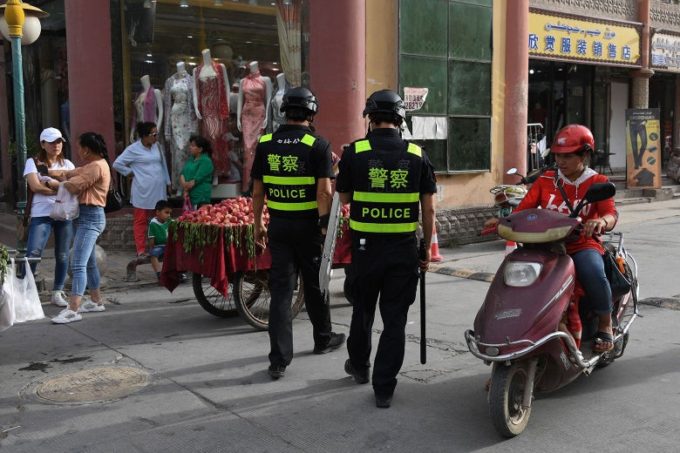China’s Global War on Terrorism

Slate, 27 August 2019
 By Colin P. Clarke – Chinese President Xi Jinping listed terrorism—alongside extremism and separatism— as one of “three evils” his country is combating in a June 2017 speech delivered to a summit of the Shanghai Cooperation Organization in Astana, Kazakhstan. In discussing this evil, China often uses language that seems lifted directly out of U.S.-style war on terror rhetoric. But no one should be fooled. Beijing’s sole strategy for counterterrorism is widespread surveillance and repression, completely out of proportion to the level of threat it faces. It is using the threat of terrorism to mute international criticism of these practices—and to export them abroad.
By Colin P. Clarke – Chinese President Xi Jinping listed terrorism—alongside extremism and separatism— as one of “three evils” his country is combating in a June 2017 speech delivered to a summit of the Shanghai Cooperation Organization in Astana, Kazakhstan. In discussing this evil, China often uses language that seems lifted directly out of U.S.-style war on terror rhetoric. But no one should be fooled. Beijing’s sole strategy for counterterrorism is widespread surveillance and repression, completely out of proportion to the level of threat it faces. It is using the threat of terrorism to mute international criticism of these practices—and to export them abroad.
It’s Beijing’s handling of Xinjiang province that shows what a Chinese counterterrorism strategy really looks like. Over the past decade, groups advocating separatism for Xinjiang’s Muslim Uighur minority—including the Turkistan Islamic Party and before it, the East Turkistan Islamic Movement—have been linked to numerous low-level attacks using knives and vehicles as weapons. China responded by putting between 1 million and 3 million Uighurs in concentration camps, which government spokespeople refer to as “vocational training centers” that “purge ideological diseases.” The government has also adopted technological tactics to suppress the Uighurs including compulsory software installed on phones, satellite navigation systems installed in vehicles, and the use of identification cards and biometric profiles to restrict the movement of local populations.
China’s treatment of the Uighurs has provoked an international outcry from human rights organizations and civil society groups, although the response from governments, including in Islamic countries like Saudi Arabia and Pakistan, has been muted. A tepid response from Washington may have further emboldened Beijing.
The question now is whether China may next look to export its draconian security state apparatus under the guise of collaborating on counterterrorism.
As the Belt and Road Initiative, China’s massive ongoing international investment program, continues to expand, Beijing will confront the security implications of building visible projects in unstable regions plagued by civil wars and state failure. Already, it is a target in countries like Pakistan, where its consulate has been attacked and where Chinese citizens, including government officials and prominent businessmen, have been subject to attack and kidnapping for ransom. (A Pakistani separatist group known as the Baloch Liberation Army has claimed responsibility for several of these attacks.) Chinese nationals have also been the victims of terrorism in Africa, where groups linked to the Islamic State and al-Qaida have attacked soft targets, including hotels.
China also shares a small border with Afghanistan, and there are worries that it could again become a bastion for jihadist violence as the U.S. withdraws its troops and al-Qaida and ISIS’s local affiliate begin to rebuild. China has already begun hardening some of its bordersthroughout Central Asia and will likely need to devote more manpower, either through troops or private security contractors, to protect its investments in Afghanistan and other parts of Central Asia.
In the meantime, Beijing’s treatment of the Uighur Muslim minority is becoming a liability. Xi and other Chinese leaders have been featured in jihadi propaganda, and the cause of Uighurs may be elevated by the global jihadi movement as it seeks to publicize the plight of disenfranchised Muslims from Palestine to Myanmar and beyond.
Historically, China’s counterterrorism posture has been defensive in nature. But given its increased international commitments, that could change.
Beijing might look to export elements of its repressive security apparatus to protect its interests abroad and its borders. Its “automated authoritarianism” model—along with the technology and know-how—might be particularly appealing to authoritarian (and even nonauthoritarian) countries such as Egypt, Pakistan, Singapore, and Turkey. With its low regard for human rights, China would be willing and capable of assisting its allies and client states by providing the technology, know-how, and maintenance to sustain it. To deploy such a system at scale, China would need to forge new alliances and cement existing ones, although this is not entirely unfeasible given Beijing’s ambitious Belt and Road Initiative and aggressive campaign to push telecom company Huawei as the 5G backbone of the future.
By implementing its own version of counterterrorism abroad, China could seek to transition from the more subtle, soft-power approach it has typically favored to a more militaristic and security-conscious modus operandi.
If China is ultimately successful in cooperating with other nations on counterterrorism, that leaves the U.S. in an awkward position. Washington will be less likely to share intelligence or provide technical assistance to countries actively working with Beijing. While some in the Beltway might celebrate this shift as burden sharing, it would ultimately limit the scale and scope of partnerships that the U.S. can maintain with countries in strategically vital regions of the world.
China’s model of counterterrorism is resource intensive, with automation offsetting some issues of manpower and data processing. If it spreads beyond China, it also presents a bleak future, characterized by a disregard for human rights and use of technology as a force multiplier for internal security and counterterrorism operations.
Just last week, social media accounts that originated in China were comparing the pro-democracy protesters in Hong Kong to Islamic State jihadists. The phrase Global War on Terror was always a poor choice of words, used to justify a wide variety of abusive and counterproductive practices by the U.S. and other democracies. Now, this ill-defined concept is being used by an authoritarian state to stifle democracy, subdue an ethnic minority, and promote repression around the world.
https://slate.com/news-and-politics/2019/08/china-terrorism-xinjiang-repression-islam.html

